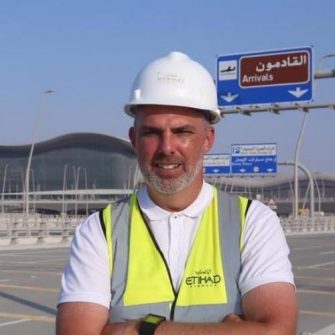
Graham Stevenson
MAv (Management) - 2018 Graduate
Director - Ayesa (UK and Ireland)
What appealed to you about UNSW and your degree?
As my career in consulting engineering and project management progressed, I became involved in Aviation projects, which I really enjoyed. I knew if I wanted to stay in the Aviation industry long-term, I would need further specialist knowledge, to legitimise and validate my position. I completed my master’s in project management in 2004 with UNSW, and had such a positive experience, UNSW was really the only choice in furthering my studies. The flexibility of the program was an ideal choice whilst working overseas with a young family.
What is the most valuable thing you took away from your time at UNSW?
The range of subjects available in the master’s program gave me the opportunity to specialise in certain topics, while gaining more general knowledge in other aviation disciplines. Aviation is such a varied field; the master’s was able to give me a good grounding in so many areas of the industry. My degree with UNSW Aviation has been invaluable to my career, in providing me with both credibility and knowledge.
Where has your career taken you?
During the course of the program my career progressed at Etihad Airways. I began my career at Etihad Airways in 2013 as Senior Manager - Entry Into Service, project managing the introduction of the A380 and B787 aircraft types into Etihad Airways fleet. In 2015 I progressed into my current role as Head Midfield Programme in which I must drive effective coordination through an informed, knowledgeable grasp of issues across Midfield Programme decision and delivery levels. In this role I have drawn on much of the diverse knowledge gained from the UNSW Aviation postgraduate program to deal with a wide range of issues.
What innovations do you think the industry needs?
There is currently a significant drive for the introduction of new technology in a variety of areas of the industry, which the COVID-19 pandemic has expedited. As part of my current programme, the introduction of Self-Service technologies is being pursued to develop technology channels to assist guests when departing or transiting through Abu Dhabi. The main drivers for these initiatives include providing guests with more transaction options (including contactless offerings), while overall making the guests end-to-end airport experience smoother, with more efficient process flows. Ultimately in order to promote confidence within the air travelling public, airlines and airports need to provide guests with the maximum level of comfort possible, that everything that practicably can be done, is being done to make commercial aviation as safe and efficient as possible.
What would your advice be for those currently studying or considering the study of Aviation at UNSW?
I believe there has never been a better time than now to study Aviation. There is always peaks and troughs in the industry, once this unprecedented event passes, the industry will recover and need more young, qualified people with comprehensive aviation knowledge. There will be a lot of opportunity on the other side of this pandemic.
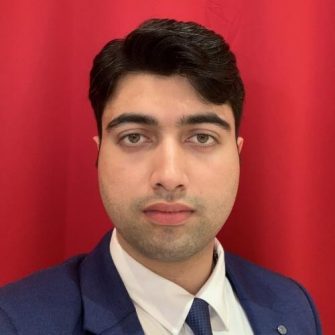
Omar Choudhary
BAv (Management) - 2018 Graduate
Route Performance Analyst — Qantas
What appealed to you about UNSW and your degree?
Growing up my Dad would travel a lot for work, and we would always go as a family to drop him at the airport. Although it was sad seeing him go, I would forget the sad when I was in the airport environment. The buzz of the airport with the flight crew and aircraft, being able to see all the equipment was where my passion stemmed from.
I knew the UNSW Aviation Management program was the one for me. UNSW as a university was always a dream of mine because of its ranking in the world and its reputation within the industry.
What is the most valuable thing you took away from your time at UNSW?
The most valuable thing about the program is the wealth of experience you gain from the industry experts and guest lecturers. Being about to get their insight and ask questions was invaluable to me as an undergraduate.
The whole campus feel was another aspect I loved and now doing my Master’s, I actually miss. Having access to the UNSW library with all the resources and study spaces was so valuable to the success of my studies. The Aviation Student Society, AvSoc, was really engaging and brought the social side of the university experience. It was really valuable to connect and network with like-minded people my own age.
Where has your career taken you?
Towards the end of my Bachelor degree I was working part time as a Passenger Service Officer with Menzies Aviation. An opportunity came up through the School of Aviation to apply for a role at Qatar Airways. It was about a 6-month process from application to beginning my role as a Cargo Flight Analyst. I am currently completing my Master’s through UNSW and am really enjoying being able to tailor my degree to complement my role, helping me to better understand it.
What innovations do you think the industry needs?
I believe that there is a long way for the industry to go in terms of being more sustainable. More concentration needs to be made in terms of working towards minimum emissions and more efficient bio-fuels.
I also believe that the industry has a lot of challenges in terms of the current market in 2020. There is a lot to do to not only restore public confidence, but passengers are seeing problems surrounding government travel bans, passenger caps and border closures. Airlines and other players need to come together to get through this difficult time.
How can someone arrange their travel if they are unsure if they can re-enter their country again?
What would your advice be for those currently studying or considering the study of Aviation at UNSW?
Aviation is a great career which allows you to interact with so many people of different backgrounds. It is a very fast paced, dynamic industry where every day brings a new challenge to keep you on your toes! If Aviation is what you are interested in, there are a lot of opportunities for a great and long career path that not a lot of industries offer. Us Avgeeks have to stick together!
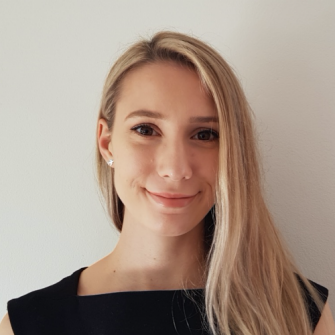
Robyn Thomson
BAv (Management) - 2017 Graduate
Airport Planner — Sydney Airport
What appealed to you about UNSW and your degree?
I have always been interested in STEM. I was originally looking into engineering and chemical analysis degrees, although I also believed a management qualification would help me further along in my career. I appreciated the cross-section of science and business which was the aviation degree.
What is the most valuable thing you took away from your time at UNSW?
The UNSW Aviation community are the best part of the course. I felt like my voice as a student was always heard through the AvSoc (Aviation student society), the students and the school have a really close connection. The teaching staff were always there to not only challenge you but as a student I felt valued. I knew I could approach any lecturer or staff member to ask any questions about anything.
The course helped me broaden my idea of the aviation industry from being more than just airlines. It added another level of knowledge, understanding the different facets of the industry from aviation regulators to airports and maintenance. The course itself not only taught aviation-specific skills but core knowledge that can be applied to other industry areas. The course allowed me to build up and broaden my understanding of specific areas which helped to be appreciate why companies do things differently, and why certain decisions are made.
Where has your career taken you?
In my role as AvSoc President I was able to meet a number of industry professionals as we planned the careers day. During this time I met someone from Sydney Airport who kept me in mind for a role that had opened up in the resilience team. I was very fortunate and not long after finishing my degree I started working as the Resilience Coordinator in the emergency management team. At Sydney Airport, I was in a role where I was supported and was able to contribute and explore to areas beyond the scope of my position.
I have always been interested in airport operations but I wanted to expand my aviation experience and knowledge. I began my master’s degree with UNSW and became very interested in airspace management and planning. There were no roles at the time in airspace, so I moved into my current consulting role with To70 Aviation. This role has allowed me to build my technical knowledge and experience within different parts of the industry, which once combined with my master’s degree will allow me to further my career into a management role with a holistic appreciation of industry.
What innovations do you think the industry needs?
I believe that innovation in industry will come from inclusion of diversity in decision making processes. I am currently the only female of 9 people in the To70 Australian office, I would love to see this grow. Aviation is an industry where technology changes so rapidly, AND sometimes our regulations fall behind. If we bring a diverse group of people into the discussion, I believe we can plan, design and operate with more success.
What would your advice be for those currently studying or considering the study of Aviation at UNSW?
The level of expertise and the overall holistic education an aviation degree provides students is a wonderful way to kickstart your career. The program is taught by people with real industry experience, who are able to explain the concepts in a way that was transferable to other industries.
For students currently studying aviation I would encourage them to not turn their head to small opportunities. It is good to have big goals and dreams, but a small opportunity can lead to something much bigger.
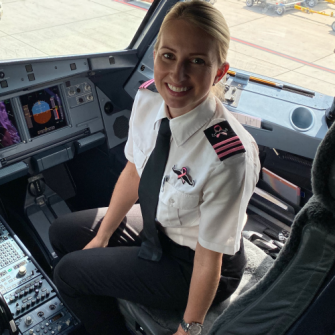
Rosina Helbig
MAv (Management) - 2016 Graduate
First Officer — Jetstar
What appealed to you about UNSW and your degree?
At the time I began my master’s degree I was working for Jetstar in the Human Resources department and wanted an extra edge, something more that was solely based in aviation. I was comparing the different masters courses around Australia and found that UNSW offered the greatest number of topics that aligned with what I thought I would enjoy. My colleagues at Jetstar highly recommended the course, they found the course super valuable and really enjoyed it. Everyone I have spoken to about the course has vouched for the support provided by the staff at UNSW Aviation, which was really important to me going into a degree program.
What is the most valuable thing you took away from your time at UNSW?
There were so many things I hadn't considered in my day-to-day work, you 'really don’t know what you don’t know, until you know'. There are many things and people around my profession which have an impact on the ability for me to do my job. Learning about what other people do to make my job possible gave me huge scope to the entire industry and an appreciation for the backend of things.
Being a pilot, there is so much more that I can offer than flying a plane. There are opportunities within my company to be a ground school or human factors instructor, or work on other meaningful projects. The master’s degree really opens these doors for me to work in other areas of the industry or in other industries such as transport, especially in a scenario where if I couldn’t fly.
Where has your career taken you?
When I began my master’s degree, I was working in the Human Resources department at Jetstar. I left Jetstar to pursue my flying dream. I began flying for Regional Express Airlines after completing their pilot cadetship. I worked as a First Officer before moving back to Jetstar in 2014. My master’s degree has made me a more competitive candidate, knowing that I can also work in the administration side of aviation. It has also given me opportunities to be involved in pilot recruitment.
What innovations do you think the industry needs?
There is so much progress to be made in terms of making aviation a greener industry. This is not necessarily in just fuel, but in terms of food packaging, the knives, forks and cups. I generally fly around 4 flights a day and there are several bags of rubbish from each flight. This all builds up so quickly. Recently Qantas flew the first zero waste flight, this is a great start to making flying more sustainable.
In terms of flight licensing, potentially creating a universal, global level pilot licence to the exact same standard. This will help make the qualification more transferable across the globe. For an industry so international, there are so many variants of pilot licences.
What would your advice be for those currently studying or considering the study of Aviation at UNSW?
There are so many different aspects to aviation, it is not just flying planes and planning for it. There are a variety of aspects that go into you being able to do your job, every role is reliant on so many other people in the company.
The aviation industry is very reactive. Although we do see downturns in the industry, it’s always followed by an upturn. The industry will always recover slightly changed from its previous landscape and with that change comes more exciting opportunities.
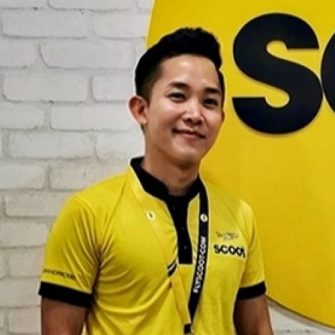
Eugene Yeo
BAv (Management) - 2016 Graduate
Section Manager, Revenue Management — Scoot
What appealed to you about UNSW and your degree?
I’ve always loved aviation, ever since I could remember, and it was a natural progression for me to want to pursue a career in the aviation industry.
I was looking for a university program that would allow me to gain invaluable knowledge about the aviation industry in a holistic environment, and UNSW’s Aviation (Management) program was the first-in-mind. The university’s setting in multifaceted Australia was a huge draw, and its stellar global academic reputation and the strong credentials of the School of Aviation’s team definitively sealed the deal.
What is the most valuable thing you took away from your time at UNSW?
Looking back, I’m glad I made the decision to study at UNSW. I acquired vital industry-specific knowledge and insights under the tutelage of UNSW’s experienced team, which prepared me well for the rigours of a career in the very dynamic aviation industry. I also forged invaluable friendships and connections with schoolmates from all walks of life, which is something I hold very dear!
Where has your career taken you?
I joined Scoot (a Singapore-based low-cost carrier) as a Revenue Management Analyst fresh after graduation. My role involves maximising passenger revenue on flights through pricing and inventory controls (doing Dr Ian Douglas proud). I really enjoy working in the fast-paced and dynamic airline revenue management role, and currently manage a team of revenue management analysts and officers.
The invaluable aviation industry knowledge and experience gained through UNSW and Scoot have also allowed me to take on an Adjunct Lecturer role at Temasek Polytechnic’s Aviation Management diploma program. In this exciting new role, I teach night classes for an Airline Business module, allowing me to share my knowledge with budding aviation industry professionals.
What innovations do you think the industry needs?
The current static airline pricing model relying on fixed fare classes has been in use for at least the past 50 years. This is despite numerous innovations and advances in pricing models adopted by other industries, e.g., ride-hailing services. There is significant room for customisation and increased dynamicity in airline pricing, to leverage consumer willingness to pay and better target products at relevant passenger segments. This is with the end-goal of providing a more customised experience for each passenger and achieving better revenue outcomes for airlines.
What would your advice be for those currently studying or considering the study of Aviation at UNSW?
If you’re looking for a head start in the aviation industry, I cannot recommend UNSW’s Aviation program enough. Studying at UNSW Aviation will definitely equip you with the necessary knowledge and connections to place you well for a career in the aviation industry.
The aviation industry is currently in doldrums, and times may seem tough now, but hang in there! Aviation is the lifeblood of nations and economies, and a recovery is definite and on the horizon. The best is yet to come!
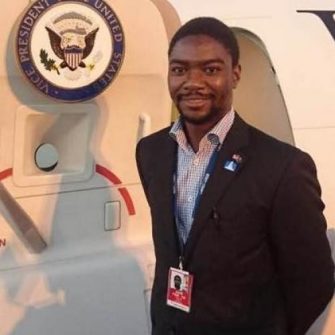
Kelvin Dzwete
MSc Tech (Aviation) - 2015 Graduate
Operations Manager — Aero Adapt
What appealed to you about UNSW and your degree?
I had the opportunity to go to an airport excursion with my school when I was still in Primary. While at the airport, I was fascinated by how the whole process was choreographed i.e. people and machines. This led me down a path of research and fact finding. The more I dug, the more enamoured with the aviation industry I got. There was a time I was into cycling and during this time, I was watching a cycling event that rode past UNSW. This got me on yet another research and fact-finding mission to learn more about the school, and the story goes.
Toward the end of my penultimate high school year, I attended a few Open Days and on the list was UNSW. Not only was the campus beautiful but my earlier research had yielded that UNSW was (is) world class education provider. I initially intended to apply for a different science degree however as I was in the queue, I noticed there was also a booth for the School of Aviation tucked away in the corner. This brought memories from younger years when I had been fascinated by the industry and so I went and spoke with the people there. By the end of the conversation mind was made, and I had an application form in hand.
As I moved into my master’s program, I appreciated the flexibility of the program and the variety of subjects offered. Working in the industry, I find the alumnus status of UNSW Aviation invaluable as it makes the initial connection so much easier and you know the level of understanding they have of aviation.
What is the most valuable thing you took away from your time at UNSW?
It was the foundations, the 'know-how' and the aviation language which has been invaluable to me in my career. Sometimes I work with people who do not have any aviation background, and they often find it difficult to balance their specified field within aviation. Having the ability to mix and make sense of general business aspects in an aviation context makes working in the industry BETTER.
My master’s thesis was surrounding the out-sourcing of skills from large aviation companies. This is directly tied to my role and what I was achieving at the time. It was interesting to see the 'big company' perspective throughout the course and compare it to the other side of the industry, the subcontracting work. Completing the paper from my context, being the person who is subcontracting to the airlines, justifying to these companies why they should use my resources has become so valuable to the success of my career.
Where has your career taken you?
Whilst I was completing my master’s, I was promoted to a Senior Operations Controller position at Aero Adapt. As a flight support company, we complete a lot of the background work that the typical passenger wouldn’t see in the industry. In my current role as Operations Manager I 'choreograph the whole dance' meaning I look after a variety of teams who arrange everything from international permits and permissions, ground handling, fuelling, to crew and pax support and more. My job is to ensure everything from A to Z in the flight runs smoothly, putting out any potential fires before they even start.
What innovations do you think the industry needs?
COVID-19 has been an eye opener for the sustainability of the industry. With more than 90% of international travel in/out of Australia being via plane, Aviation is reliant on travel and the movement of people. With traveller numbers having come to a near halt and aircraft being mothballed, there needs to be more thought around being geared for these kinds of situations. Qantas, I believe is at the forefront of this with their 7 hour scenic 'flight to nowhere'. This not only keeps people employed but assists in the maintenance of aircraft. Overall, I believe the industry is more reactive than proactive, we need to break this mould and begin to foresee potential issues.
What would your advice be for those currently studying or considering the study of Aviation at UNSW?
The Aviation industry will always have its ups and downs, it’s up to you to find out what area you are interested in and make it work. Just because aircraft are grounded now does not mean they will be forever, so in the meantime what will we do? Getting into aviation at this time is really exciting. It is the best time to implement new ideas and strategies into a quickly evolving industry.
I believe that UNSW Aviation produces high quality graduates through just comparing myself and alumnus from other universities. I would always recommend UNSW Aviation for studies.

Ian Barton
MSc Tech (Aviation) - 2015 Graduate
Duty Technincal Manager — Qantas
What appealed to you about UNSW and your degree?
I was already working in the Aviation industry as a licenced aircraft maintenance engineer, and had begun moving into more of a management role. In order to further progress in my career, I believed that I needed to gain more knowledge of the industry outside of engineering and maintenance. UNSW offered a tertiary qualification which had a profound reputation within the Qantas community, and it was the best choice for me.
What is the most valuable thing you took away from your time at UNSW?
Being involved in a small part of the industry, I was really blind to how broad the aviation industry is. The Master’s degree showed me there is so much more than what meets the eye. It’s not just pilots, mechanics and flight attendants; aviation includes scheduling, security, operation, air law and so much more. I believe the degree helped me to widen my scope of industry knowledge, allowing me to be better in touch with other divisions within Qantas and in turn made me more hireable.
Where has your career taken you?
Since I have finished my degree I have moved from an engineering role to a supervisor role and now employed as a Duty Technincal Manager at the Qantas Maintenance Operations centre. This has given me the opportunity to work on a variety of interesting projects, including the “Entry Into Service” project overseeing the introduction of 787s into the Qantas fleet. The understanding of other aviation entities allowed me to effectively communicate in my business dealings and progress further in my career.
What innovations do you think the industry needs?
The use of technology is completely undermined in the aircraft maintenance sector of the aviation industry. The utilisation of drones for inspections of aircraft and advanced airframe corrosion/damage techniques require more exploration and so much more.
I also believe more research needs to be completed around safety in contracted maintenance, repair and overhaul (MRO). There is anecdotal evidence which proves the benefits of MRO, little of which balances safety and financial aspects.
What would your advice be for those currently studying or considering the study of Aviation at UNSW?
I would tell students to give themselves as much scope as you can by getting involved in everything. Having an understanding of a wide area of the industry is such a valuable trait to employers. Pay attention whilst studying, the subjects are very relevant and current to the industry which will help you when you enter the workforce.
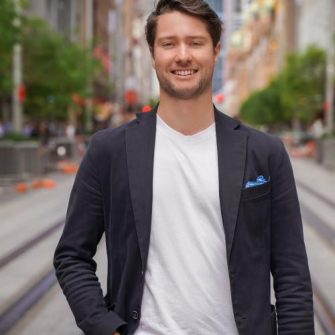
Alec Kemmery
MSc Tech (Aviation) - 2015 Graduate
CEO & Founder — SkyBuys
Where are you now?
Since joining the Airbus BizLab program in 2017, I have continued working with Airbus through my start-up SkyBuys, providing a more seamless link in passenger flow for duty free & travel retail. The company is currently working on a new the Airbus program.
How did your postgraduate degree with us help you get to where you are today?
Without the master’s program, I never would have started SkyBuys. I learnt a lot about the opportunities of non-aeronautical revenue from the subjects around airline and airport management. It brought about the light bulb moment where I noticed the gap in the airport retail market and how to fill it.
The master’s degree gave me the aviation knowledge to move into an industry I had always had an interest in, having been flying planes since well before I learnt to drive a car. The flexibility of the program gave me the ability to study from the office but also allowed me to go into the university to meet in person with both professors and peers.
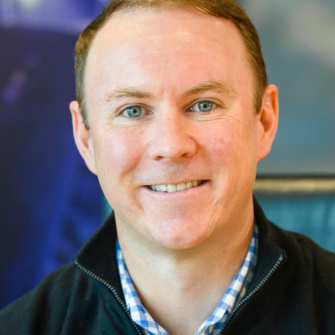
Matthew Williams
MSc Tech (Aviation) - 2014 Graduate
Managing Director — Wattletree Capital Partners
What appealed to you about UNSW and your degree?
The opportunity to study again at UNSW as part of the MSc Tech (Aviation) program was very appealing. I had a great UNSW experience during my time at the Australian Defence Force Academy and I wanted to continue my development through this world class University. The School of Aviation offered a program that focused on my aviation interest and assisted the broadening of my skills and awareness of the aviation industry. The program enabled me to select courses and subjects I thought would help my career development and prepare me for the challenges of the aviation market. The program aided my understanding of aspects of the aviation industry I otherwise had not been exposed to during the early part of my career.
What is the most valuable thing you took away from your time at UNSW?
Aside from the academic skills I gained during the program, the most valuable thing I took away from my time UNSW was a broad network of academic and business professionals from across the aviation industry. The ability to draw on the expertise and guidance of individuals across my network has been critical to my career development and progression. My time at UNSW highlighted the need to develop a robust network early and the program helped connect me with both peers and leaders operating in the aviation industry. My time at UNSW also confirmed the huge opportunity that exists in the aviation industry and solidified a desire to explore all aspects of this unique market.
Where has your career taken you?
At the time of the program I was a helicopter pilot in Army Aviation. Since completing the program I have transitioned from the Australian Defence Force and begun a corporate career. I worked with Deloitte Consulting in Canberra where I was able to build on my academic skills and develop a portfolio of consulting frameworks and tools to apply across the market. Following my time at Deloitte I moved to Babcock Australasia where I’ve had the opportunity to work across Australia and New Zealand. Babcock Australasia is a trusted partner and provider of services to the Defence, Aviation and Critical Service industries. It has been an amazing opportunity to develop my skills and knowledge of these industries through my work at Babcock. Throughout my career so far I have had the chance to participate in military helicopter operations, to conduct planning in the complex Airline environment and to develop strategy in the Aviation market. Each of my roles has been significantly different and I have learned a lot from each of these challenging positions.
What innovations do you think the industry needs?
The challenges ahead for the aviation industry are significant and will require a focus on collaboration across the aviation market. The level of innovation in technology, the broadening of aviation activities, and the commercial impact of global events, are all key considerations for the industry. These challenges will continue to impact on our ability to keep up with regulation, safety and coordination of aviation operations. Greater collaboration is required from business leaders, operators, regulators and industry organisations to ensure the aviation industry remains at the forefront of innovative technologies and is able to implement them safely and effectively. Having the ability to react quickly to changing market dynamics will be essential to the future success of the aviation industry.
What would your advice be for those currently studying or considering the study of Aviation at UNSW?
Aviation is an exciting and challenging industry to be a part of at any time in your career. With these challenges come tremendous opportunity to specialise in a specific aviation skill or develop a broad career through aviation management. For those studying or considering the study of Aviation, I would highly recommend a career in the industry. My advice is connect with professionals currently operating in the market, to take every opportunity to broaden your network and to develop your skills and knowledge. If the opportunity presents, get involved in a variety of different aviation activities to test your enthusiasm for segments of the market to help you shape your future career.

Kritika Prakash
BAv (Management) - 2013 Graduate
General Manager, Operations | Management Consultant — VIZIONX
What appealed to you about UNSW and your degree?
I was lucky enough to travel growing up, with my Dad having worked for Qantas. I loved to sit on the window by the wing and would ask way too many questions about why that part moves or why it was shaped a certain way. When I was in high school I wanted to become a doctor because I had a real interest in science, especially psychology around the areas of human factors. I was looking into a general science degree or psychology program but always had a real interest in Aviation. My decision came down to that I could have either completed one of these individual courses or a degree in Aviation which combines everything I have an interest in! My Dad completed his Master’s degree at UNSW and considering his positive experience it was the obvious choice.
What is the most valuable thing you took away from your time at UNSW?
The fact that so many of our teachers were based in the industry meant that everything we were being taught was relevant to what was going on in the Aviation Industry today. As we completed the curriculum we were hearing from aviation experts teaching us the theoretical components 'by the book'. However, we were also being taught that in real world application, this is slightly different and being able to understand how theory can be adapted in reality has been invaluable throughout my career.
Where has your career taken you?
I began my career at the Royal Flying Doctor Service (RFDS) in an administration role whilst I was in my final year of university. I learnt so much during my time at the RFDS and was able to transition into a safety and systems role. I then moved into the Air Force as a Management Quality and Assurance Officer where I worked on projects surrounding Business Management Systems development and implementation. These roles allowed me to develop a broad scope of skills which I was only able to accumulate being at a smaller company. This was so much so that when I applied for my role at Jetstar, one of the comments made throughout the interview process was "have you actually done everything on your resume?". My most recent aviation role was with JetStar as a Safety Integration Specialist.
All of my subjects (even the ones I never thought I would use) have been extremely relevant throughout my career.
What innovations do you think the industry needs?
I believe that there needs to be more innovation in terms of making travel seem safer to the general public. It has been proven that it is safe to fly in the current circumstances of COVID-19 although consumer confidence is at an all-time low. I believe that through design innovation and education for the general public, domestic tourism and travel will be able to recover and not be impacted as much in the future.
What would your advice be for those currently studying or considering the study of Aviation at UNSW?
The biggest piece of advice is to not be afraid that there is no work within the industry. I was completing my degree in the aftermath of the Global Financial Crisis and was receiving mixed messages as to what was actually out there. I knew I wanted to work in safety and human factors, but I was also aware of the limited speciality roles available. I knew I wouldn’t walk straight out of university into my dream role, so I went into administration and it was the best thing I ever did. I learnt so much and picked up so many skills I wouldn’t have if I had gone straight into my dream speciality role.

Stacey Peel
MSc Tech (Aviation) - 2013 Graduate
Director London Advisory Services — Arup
What appealed to you about UNSW and your degree?
After exploring a few university options it was that most of the lecturers were actively working in the industry that led me to choose UNSW. My objective was to learn practical skills and knowledge. I already knew aviation was a complex industry so it was important to me that those I was learning from would bring that appreciation to the course content. I made the right decision.
What is the most valuable thing you took away from your time at UNSW?
The diversity of disciplines and with that the opportunities that it brought. One unit I was reading legislation the next I was calculating terminal capacity. Related to that was the appreciation of being open to learning new things in the industry. When I enrolled I was already working in aviation security so assumed that would be my favourite subject. Whilst I enjoyed it, including learning different aspects, it was access to parts of the industry that I had never really given much thought to or appreciation for that I gained most from.
It was this degree that led me to have a keen and continued interest in human factors and organisational culture. To this day I am an active advocate of holistic security; putting the human at the heart of the solution drives better outcomes.
Where has your career taken you?
All over the place figuratively and literally!
I’ve worked for the Australian aviation security regulator in Australia, Singapore and Indonesia; seconded into Indonesia’s Directorate General of Civil Aviation; employed by ICAO in Thailand working across Asia-Pacific and now in the UK via Dubai with Arup as their Global Aviation Security Leader.
Whilst I’ve continued to specialise in aviation security, I’ve been lucky to have a wide range of experiences within it: I’ve worked in threat and risk, capacity building, regulatory and oversight, technology developments, culture change, design and contributing to the world’s sharing of such expertise. And through that I have met some of the industry’s greatest minds and characters and - most treasured - friends.
Unlike many other aspects of the aviation industry, the catalyst for security is one we all wish didn’t exist. I do however feel incredibly privileged to have had access to the wide-ranging elements of the discipline.
What innovations do you think the industry needs?
The complexity of aviation is driven by the interdependencies and interfaces between systems (physical, societal, environmental and government), humans, technology and data. The greatest successes will come with an increased recognition of these interdependencies and the greatest innovations will come from those solutions that are designed and delivered as enablers rather than problem solving alone.
For example, is a security technology solution successful if its sole focus is threat detection at the expense of human factors, passenger experience, integration with space and consideration of cost? Is it an inhibitor or enabler that the last bastion of the human to human interface in an airport is the passenger screening checkpoint?
What would your advice be for those currently studying or considering the study of Aviation at UNSW?
Network, network, network…it’s a small industry! And use the opportunity to really stretch yourself. The degree content is practical, so it’s an ideal opportunity to absorb, test and grow before you put those learnings in practice. Challenge your peers and the teaching staff to better each other’s thinking and application. The industry is epitomised by continual improvement; you’re now part of it so start that contribution early.
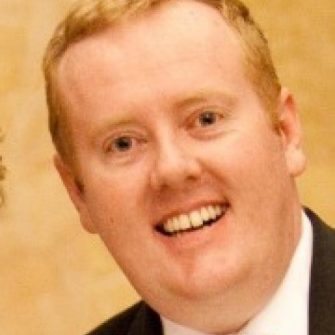
Craig Patterson
MSc Tech (Aviation) - 2013 Graduate
Team Leader Airspace Operations — CASA
Where are you now?
I am still with CASA as the Future Air Navigation Research & Development Program (FARDP) Team Lead. The FARDP is a program to deliver the national plan for airspace aviation in Australia under the new International Civil Aviation Organisation (ICAO) plan. I am working as part of the development of future airspace systems and how Australia can position its airspace infrastructure to adapt to future needs. The introduction of new technologies such as drones and Urban Air Mobility systems has gained great momentum in Australia and Globally. My team advises both industry and government, being involved in a pilot program with key industry participants as well as updating the current Asia/Pacific Air Navigation framework in alignment with IACO. In addition to the FARDP recently I contributed towards the airspace re-design and assessment around Brisbane airport to accommodate the new parallel runway and providing enhancements towards airspace safety and efficiency.
How did your postgraduate degree with us help you get to where you are today?
The program introduced me to subject areas such that were not applicable to my work at the time but since I have been able to apply. In particular airport management in terms of how its infrastructure needs to be organised to allow for smooth passenger flow from the car park to take off, one break in this flow is where inefficiencies and delays begin.
I have had the opportunity to network with course facilitators and peers as an alumni of the masters degree. It has been a key point in people seeking me out for my area of expertise being air space regulation.
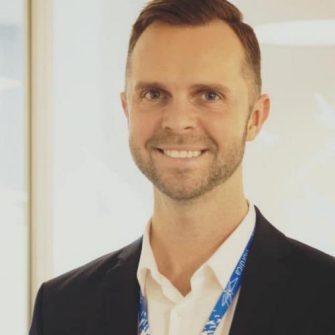
Andrew Judge
Head of Cabin Services at XFly
Head of Cabin Crew Management — CityJet
What appealed to you about UNSW and your degree?
I was flying as Senior Cabin Crew at Virgin Atlantic and was flying frequently to Sydney. I was wanting to further my studies and was looking at Cranfield in the UK. A lot of my colleagues mentioned and vouched for the UNSW Master’s program. The core reason I chose the UNSW program was its flexibility and the fact it has such a wide range of subjects. The communication throughout the course and continual improvement of platforms embedded the fact I knew I made the right decision.
What is the most valuable thing you took away from your time at UNSW?
I found challenge and interest going into detail on topics that I wasn't so familiar with such as Air Traffic Management. The program equipped me with the knowledge to be comfortable speaking and relating to anyone working in the aviation industry, especially with more of a customer service forefront. Most importantly, the program taught me self-discipline and motivation which is especially important when working remotely throughout Europe. Soon after graduating, I began working as an instructor, holding training for both cabin crew and pilots.Many instructors found instruction for pilots somewhat challenging , but the background provided by the Master’s program gave me the confidence not many others had
Where has your career taken you?
I moved into a role at Norwegian Air Shuttle supervising the Long Haul Division and training cabin crew in both Stockholm and Bangkok. I specialised in service delivery by which Norwegian Air Shuttle helped me to grow and develop my skills in this area . As my time with the airline came to an end, I felt as though my purpose with the company, to build the low-cost long haul division was completed and I was ready for my next challenge.
I moved into a management role at Xfly, the Estonian strategic capacity provider for airlines in Europe. As Head of Cabin Services, my role has a customer delivery focus for ACMI operations whilst ensuring compliance and training requirements of staff. My Master's program was what gave me common ground in my interview for this role, and I believe is a key factor in qualifying for the role.
What innovations do you think the industry needs?
There is a huge current focus on gaining passenger confidence. This stems from not just a safety perspective but also holding trust in the airline business. We need to de-stigmatise air travel - there is so little risk in flying because the industry became overly cautious from the earliest point.
We further need to be prepared for if a situation such as COVID-19 occurs again. Both airport and airline operations need to plan to adapt to these situations to avoid such a large financial struggle. I believe this operation needs to be a collaborative approach across both destinations and corporations. I would push airlines to use partners such as Xfly to fill the gaps in the market externally, rather than to be prepared for demand in-house.
What would your advice be for those currently studying or considering the study of Aviation at UNSW?
This is the best time to study aviation and challenge yourself whilst the industry is in a period of change. It will be a fascinating period to reflect on in the future and studying aviation in a period of industry change and adaptation would be extremely rewarding. For an industry that does not require general education, such as a teacher, the qualification makes you stand out. I would always encourage anyone who I talk to about my education to study at UNSW, the professionalism and motivation of all the staff and students are invaluable. UNSW Aviation really do have the right staff situated in the right place to teach students a variety of courses.

Crystal Iannou
MSc Tech (Aviation) - 2012 Graduate
Assistant Professor — Emirates Aviation University
What appealed to you about UNSW and your degree?
I have been in love with Aviation for as long as I can remember and always wanted to be a pilot. After I completed my first university degree in my home country of Cyprus, I was convinced by my mother to follow a career in Air Traffic Control, so I had to wait for the government to open the vacancies to be able to apply. So in waiting for that, I did a research trying to find universities offering Masters in Aviation. So I knew I needed to further my training in Aviation and the Master’s program offered by UNSW was the perfect fit.
It was the range of subjects offered by UNSW which originally appealed to me. There was the opportunity to complete both general aviation courses and specialists subjects in different areas of Aviation. The fact that the course was entirely online, which meant I did not have to go overseas to continue my education was also a big factor in choosing UNSW. And I also liked the flexibility of being able to organize and manage my own time for studying.
What is the most valuable thing you took away from your time at UNSW?
I appreciated the fact that the degree gave a deeper general overview of aspects of the aviation industry I was not familiar with. It also gave me deeper knowledge on the area I was most interested in, accident investigation and Human Factors. I narrowed down my research interest based off knowledge I learnt in the subjects I completed during my masters, into what ended up being my PhD thesis topic.
Studying the degree online has definitely helped me in my role today where we have transitioned to online learning. I have the skills and mindset to incorporate online learning into my teaching. The fact the degree was via distance education gave me the independence to be able to complete my PhD research and the skills to continue my research today.
Where has your career taken you?
After I completed my master’s degree I worked as an Aviation consultant and began my PhD on Human Factors in safety management systems (SMS). I attended a conference organized by a university, where I was asked to come and teach at that university. I took over teaching the Human Factors and Aviation Safety subjects. Over the years I have taken on more responsibility and I now teach Safety Security and Emergency Response as well as Aircraft Accident Investigation and Aviation legislation and also, I supervise students who are writing their thesis on Human Factors and aviation safety subjects.
What would your advice be for those currently studying or considering the study of Aviation at UNSW?
If you are passionate about aviation and are motivated to work hard, then you will go very far and be very successful in the industry. The aviation industry is not necessarily easy to get your start in. Although if you are patient and take any opportunity you can, you will get to where you want to be. You may even discover a new area of aviation which may end up being the job for you. My current career is quite different to my original plan. If I never gave other aviation sectors an opportunity and was so determined to become a pilot, I never would have discovered my true passion.
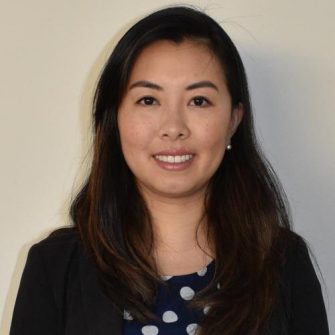
Cathy Ma
BAv (Management) - 2012 Graduate
Program Manager Cabin Crew — Qantas
What appealed to you about UNSW and your degree?
I fell into the degree completely by accident. I was unsure of what to do at university and which led to me being handed the 2009 UAC Guide. I got to the end of A and was intrigued by an Aviation degree. Aviation and travel have always had a part to play in my life; as I frequently travelled overseas to visit family. Once I started to investigate further, I realised so many aspects of aviation appealed to me particularly the challenges of such a dynamic industry and the ability to creatively problem solve, and that’s when I decided that UNSW Aviation was the place for me.
What is the most valuable thing you took away from your time at UNSW?
The strong friendships and sense of community were the most valuable aspects to me. I was pleasantly surprised to learn the UNSW Aviation degree was tailored course with a smaller cohort, and considering a university with tens of thousands of students, having a network of people to lean on for support was a huge commodity which I’ve continued to use today.
Also, I really appreciated the content of the course, especially the industry expertise through guest speakers that was prominent in all classes. Guest speakers turned theory into the practical, and I was able to use this knowledge in job searches and in my work. We were always given current topics to tackle. For example, we discussed heavily whether Sydney should have a second airport, something we now have an answer to!
Where has your career taken you?
Whilst in my second year of my undergraduate degree, I was successfully selected as a Qantas operations intern in their Summer program. Following that I was successfully selected into the Qantas Graduate Program. The broad aviation knowledge helped me to hit the ground running, even little things like already having the knowledge of aviation acronyms.
Following the Graduate Program, I moved into Qantas’ Airport Strategy team who lead the management of the relationship between Qantas and various Australian airport authorities. Both entities are necessary to provide an essential service for the travelling public and being part of the dynamic was an interesting space to be in. In that team, I led the concept design and managed the introduction of self-service check in automation at Sydney Airport.
I am now part of the Customer Experience Product and Service team, continuously looking for opportunities to enhance the customer proposition across the end to end journey. I’ve been focusing within the airport environment, where technology can further enhance the experience, which is now more relevant than ever with the advent of COVID-19 and its effect on travel.
What innovations do you think the industry needs?
Broadly, innovation in fuel management and sustainability has become increasingly important with the concerns of the travelling public change as we become more aware of the effect our behaviour has on the world around us. In addition, I’m interested in seeing how technology can be leveraged to make tasks and the travel experience simpler and seamless.
What would your advice be for those currently studying or considering the study of Aviation at UNSW?
Studying Aviation or any degree for that matter, is what you make of it. If you put 100% effort into it, you will find it rewarding and exciting. Aviation is varied and constantly changing, no two days are the same. This means there are lot of opportunities to be a part of something new. The industry is widely varied with many pathways that can be taken, so if you’re up for the challenge – I recommend it!

Indunil M Weerasinghe
MSc Tech (Aviation) - 2012 Graduate
Aviation Safety Regulator | Maintenance Specialist Engineer — CASA
Where are you now?
After completing my postgrad degree in 2011 by distance learning , I moved to Australia in 2013. I now do mainly freelance work in the area of continuing airworthiness management. I also embarked on postgrad research on the impact of maintenance task card design on safety outcomes. In 2019, I began my entrepreneurial journey with my start-up SkyChain Laboratories. Through this venture, I'm exploring how aviation organisations can leverage blockchain with a particular focus on how we can help aviation organisations transform into paperless workspaces.
How did your postgraduate degree with us help you get to where you are today?
Both my Masters and postgraduate research program were game changing, allowing me to fill the gaps in my aviation knowledge I did not even know I had. When compared to similar programs, UNSW is the only masters which consists of 100% aviation courses. This allowed me to really knuckle down and focus on the industry which I love. The flexibility to tailor the master’s program to broaden my understanding of the industry helped to build my confidence, leading to several opportunities throughout my career. The course material was delivered by people with lived experience, providing me with invaluable insights.
My research methodology skills, picked up during my postgraduate research, is not unlike the start-up process: we start out with a hypothesis (customer pain point) and methodically work towards either proving or disproving it. The structured thinking I honed during my research has no doubt fed into how I have built the broader narrative at SkyChain Labs.

Yelena Mirzaian
BAv (Management) - 2011 Graduate
Head of Technology (B2C) — Qantas
Where are you now?
During my time in the Aviation industry, and I have had roles in IT, Loyalty, Product, Strategy and Ground Operations.
I started my career at Virgin Australia, during my time there I was involved in their re-banding from Virgin Blue to Australia, I launched an invitation only club lounge, I introduced customer self service initiatives both at airports and online, I managed above wing at airport technology both in terminal and for aircraft dispatch.
I then joined Velocity, which is Virgin Australia’s Frequent Flyer Program where I managed a small call centre team, I also launched new partners and managed their marketing and day to day operations and ended my time the group in the business development, acquiring new business and signing new contracts for the Frequent Flyer Program.
After leaving Virgin I joined Qantas to leave my footprint there by enhancing their technology solutions both on and off airports.
What skills did you pick up whilst doing your undergraduate degree that has helped you in your career? How has your start with UNSW Aviation helped you to get where you are today?
To this day, all these years on, I still refer to elements of my degree in Aviation (Management), it formed the foundation for my career and has given me invaluable insight to the intricacies and volatilities of this industry.
What about the program has really stuck with you? What features do you like about the program?
The People - The most valuable thing I took away from my time UNSW has been a network of individuals from across the aviation industry. To this day, I still look forward to catching up with my old lecturer Ron Rosalky, he has been an invaluable industry mentor to me over the years.
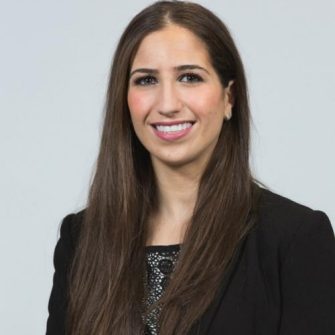
Jenalle Daniel
BAv (Management) – 2010 Graduate
Commercial Manager — Qantas Loyalty
What appealed to you about UNSW and your degree?
Since I was a kid, I have always been fascinated by anything related to aircraft, airplanes, aviation and flying. I travelled on my first international flight when I was 6 years old and the flight crew took me to see the cockpit of the plane – this is one experience I’ll never forget. I used to dream about being a pilot but when I looked into the Aviation Management course at UNSW, I learnt that I was more interested in the way the total airline works, not just the flying aspect. The Aviation industry is unique and very dynamic, making it an exciting industry to work in. I knew that studying at UNSW, I would have lecturers that had real-world experience allowing me to establish a successful career.
What is the most valuable thing you took away from your time at UNSW?
During my time at UNSW, I took part in various team and individual assessments which allowed me to think about the technical and non-technical services involved with aviation passenger, cargo, emergency and defence operations. I developed a broad understanding of the industry and acquired strategic thinking and decision making skills which are relevant to my current role at Qantas.
Where has your career taken you?
During my third year at UNSW, I started in a junior role within the SME corporate sales team and worked my way up to become a Business Development Manager at Qantas. I now have over 10 years of corporate sales and customer service experience and I am responsible for the ongoing account management of a corporate sales portfolio (~$60m p.a. in air travel revenue) on behalf of Qantas. My key responsibilities include, negotiation of commercial contracts, strategic planning for tactical activities to assist with contractual performance and the on-going identification of incremental revenue opportunities. My role has allowed me to develop strong commercial relationships with key stakeholders across various industries.
What innovations do you think the industry needs?
Innovations which create a better customer experience throughout any stage of the travel process will be invaluable. For example, introducing blockchain technology to improve the passenger identification process, reducing the need for multiple ID checks at airports will benefit travellers. In addition to this, Artificial Intelligence (AI) will further modernise customer service and improve efficiency. Virtual assistants and chatbots are just some of the AI powered products which have effectively provide traveller support and personalisation. AI could be used to minimise traveller dissatisfactions at the time of the disruption creating a better customer experience.
What would your advice be for those currently studying or considering the study of Aviation at UNSW?
Find your passion and get some experience with what you love. Your qualifications will get you an interview but experience and passion will get you further!

Anthony Waters
ANTHONY WATERS MSc Tech (Aviation) - 20
Captain — Qantas
Where are you now?
I have been working with Qantas for as a line captain for almost a year. I have been a type rating instructor on the A330 and held a role as Head of Training designate for a Qantas international project. I am looking forward to the future opportunities my training will bring me.
How did your postgraduate degree with us help you get to where you are today?
I gained a lot of opportunities from my master’s degree. The fact I was completing the course opened the opportunity to move into a management role during my time at Jetstar. A degree is highly valued outside of the cockpit, especially one with such industry experience and credibility. My master’s degree gave me the confidence and hunger to further my education. I am currently looking into studying an MBA to further the opportunities postgraduate education can bring to my aviation career.
In a highly technical job, like most in the aviation sector, it is often hard to differentiate yourself from other people, especially when it comes to promotions. Having a degree from UNSW enables you to potentially pivot into another role. As a pilot, I knew I needed a degree which gave me a people management foundation whilst expanding my knowledge in the Aviation industry, to be able to move into a management role.
What innovations do you think the industry needs?
There are so many innovations the industry needs today especially in light of the current situation of COVID-19. An example would be Boeing, who are currently researching and implementing the use of laboratory UV light that kills germs.
It has also raised the issue of increased flying times due to abundance of air traffic. There is so much that can be done in this area to improve the speed of air travel.
When I learnt to fly, it was free to land at any airport. The monopolisation of airports has become more prevalent as has the competition in landing time slots increases. There is an opportunity for huge innovation in this area.

Ryan Smith
BAv (Flying) - 2009 Graduate
Captain — QantasLink
What appealed to you about UNSW and your degree?
I always wanted to be a pilot but I also believed a university degree would be beneficial for my career long-term. The Bachelor of Aviation (Flying) was the perfect fit for me as it ticked both boxes. UNSW was also the only university whose flight training was completely in-house which I believed would give better outcomes. Having worked for the university years later, it reconfirmed I made the right choice.
What is the most valuable thing you took away from your time at UNSW?
Being taught the flying perspective within the aviation discipline was of great value throughout my career. It taught me the responsibility that you need to not only be a good pilot but a good operator as well. The emphasis on working as a team within projects and in day-to-day, as well as the importance of on-time flying were invaluable traits I have taken into my career. At the time it felt like tough love but it has definitely been beneficial in the long term.
Over the last decade I have kept in touch with many of my friends in my cohort. My 3 years at UNSW were the most fun I have had in my life and can never be replaced. The combination of the flying course being so unique and having an entire cohort with the same interest as me, contributed to the best years of my life.
Where has your career taken you?
At the peak of the GFC, I was battling a pretty doom and gloom time for the aviation industry. I went to every flight school in Sydney and even down to Melbourne in an attempt to get a job. Eventually Basair hired me part-time, and I worked my way into a full-time role. After two years with the company they gave me charter work and offered me a team leader position at Cessnock. A year later UNSW Aviation gave me an offer to join the Flying Operations Unit as a Flying Instructor which was too good to refuse, so I moved back to Sydney and worked out of Bankstown for 3 years.
In 2016 I moved into QantasLink as a First officer of the Q400 and made my way to Captain of the Q300. An opportunity came up in training camp for me to teach human factors as well as Dash 8 ground schools. I have the best job and love every minute of it. The last few months have been a bit rocky and at the moment I am flying the Dash 8 200/300 series domestically and I absolutely love it. I am now training new pilots to fly the Dash 8. There is so much satisfaction out of flying an aeroplane that is not significantly automated.
What innovations do you think the industry needs?
I believe that the industry still hasn’t mastered air traffic into really busy airports. Even though you might leave your destination on time, you may need to wait at Sydney to land because of lateness from earlier flights. Although I am sure the new Western Sydney Airport will help to ease the pressure on ATFM.
There are always improvements required for fatigue management. Being a commercial pilot can be tough, with 9pm finishes and needing to be back at the airport to fly again at 6am. Some airlines such as Qantas are quite successful in this area but more can always be done.
What would your advice be for those currently studying or considering the study of Aviation at UNSW?
Don't get into aviation because being a pilot is 'cool' and you have the potential to get a good paying job. Learn more about the industry and potential job prospects that aren't just commercial flying. I was completing ground school in the wake of the GFC, don't let something that is external to the industry get in the way of your decision. If you feel concerned, I don’t blame you but I stuck it out and made the most of my time. I did not jump into the job I imagined having straight away, but you will get there eventually.
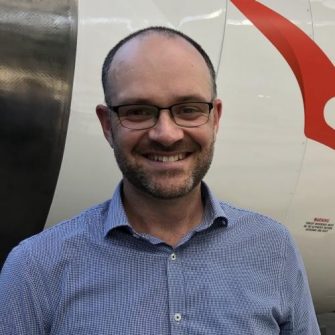
Nathaniel Foster
BAv (Management) - 2009 Graduate
Senior Manager — Revenue Optimization at Qantas
Where has your career taken you?
Since graduating in 2008, I have been fortunate enough to work in an area of aviation I have been passionate about, Revenue Management (RM). Over the last 12 years I have been working for Qantas International in RM, an area of the business that uses historical data and competitor analysis to implement pricing and inventory strategies for the purpose of maximising passenger revenue. During this time, I have worked with Joint Business partners including Emirates and China Eastern as well as spent time based in the US representing Qantas’ RM interests with American Airlines. I am currently working as Senior Manager – Revenue Optimization/Shared Services, a role which defines and maintains the Qantas strategy relating to Revenue Management processes, systems optimization, fares distribution and business intelligence insights.
What innovations do you think the industry needs?
Whilst the industry has adapted well to the changing travel needs of the consumer, aviation must continuously strive to innovate in order to thrive for decades to come. Commercially, with the introduction of concepts such as Dynamic Pricing, Personalisation and airline specific Distribution Platforms, airlines are continuously refining what product and prices are offered to each consumer, and when, in order to better align a their willingness to pay to what is offered to them. To achieve a scalable outcome, heightened machine learning and AI will be required to know more detail about customer groups and individual behaviours. At this point the industry has only hit the tip of the iceberg.
What would your advice be for those currently studying or considering the study of Aviation at UNSW?
Be open minded when selecting subjects. University is your opportunity to explore a diverse range of topics which could spark your interest in an area of aviation you never knew existed or were interested in. If possible also try and gain work experience whilst studying as it can allow you to test your interest before specialising as well as create key contacts prior to entering the workforce.

Captain Brett Dowsing
MSc Tech (Aviation) - 2008 Graduate
Retired Naval Officer — Royal Australian Navy
I am currently in my 42nd year of service in the Royal Australian Navy having had a career biased to aviation and shipboard operations - I have flown a multitude of aircraft types predominately helicopters, been in command of our Seahawk squadron (816 Sqn) and maintain civilian CPL (A/H) qualifications. I undertook the UNSW Aviation Management program with a view to enhancing my professional knowledge of the civil aviation industry and consequently my overall specialist knowledge. This pursuit was directed at improving my performance through the addition to my credentials offered by this program. Due to my career requirements, the course components were undertaken by distance learning whilst posted to the USA, and several states in Australia. These aspirations were fully met and expectations largely exceeded. The course material was contemporary and comprehensive, and the guidance of the lecturers constructive and encouraging. At all times I felt completely comfortable while being appropriately challenged by the course content. At the time I was completing a significant part of the program, I was a member of a Military Board of Inquiry into the crash of a Navy helicopter and its associated fatalities. The course content was completely relevant to my participation in this Inquiry and, indeed, contributed directly to my enhanced understanding of the complexities involved as causal factors, and in my ability as an Inquiry officer. As a very mature student on the UNSW Aviation Management program I unequivocally endorse this course as a venue to enhancing one's professionalism both directly for those engaged in aviation but also for those involved in multi-modal operations and complex management environments. I am using the knowledge-based skills gained through this program on a daily basis and envisage this continuing for the remainder of my career and beyond.
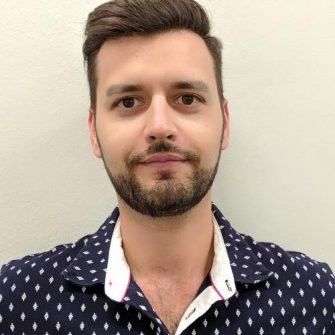
John Frisina
BAv (Management) – 2007 Graduate
Air Traffic Flow Management Consultant
What appealed to you about UNSW and your degree?
UNSW has always had a superior reputation and it was a goal of mine to study there. After attempting a semester of chemical engineering at UNSW, the staff were able to guide me into my core interest of Aviation. I was supported and advised on the subjects I needed to complete to make the transition as smooth as possible. The Bachelor of Aviation degree is industry leading and lecturers that teach the subjects in the degree are very prevalent and respected within the industry. Having the ability to study at UNSW and complete a degree that provided me with industry relevant skills and knowledge was invaluable to my career.
What is the most valuable thing you took away from your time at UNSW?
It's hard to settle on "the most valuable thing", as I took away so much from my time at UNSW! The UNSW Aviation reputation within the industry provided me with the recognition to stand out in a competitive job market. I cannot emphasise enough, how my degree with UNSW set me up to begin my career in Aviation. Without the knowledge and skills I learnt, I never would have been able to solve problems arising in each of my roles. Professor Richard Wu exposed me to the use of mathematical modelling and operational research application to improve almost any aspect of aviation operations. In addition to a world class education, the people were also the most valuable thing I took from my time at UNSW. Many of my cohort I still network and am friends with to this day.
Where has your career taken you?
I began my career in Aviation at Regional Express Airlines as a data entry clerk while studying Aviation at UNSW, before moving into a crewing officer role. I became interested in airline network operations management and operations control. With experience gained in managing the crew aspect of airline operations, I secured a role with Jetstar as an operations controller and eventually became involved in a national project on Air Traffic Flow Management (ATFM), designing a system to minimise airbourne delay at major airports. From here, I joined Qantas, where as an operations system expert, partnered with a travel intelligence software company to develop an evolutionary operations control system that used system based algorithms and business rules, to help operations controllers make decisions and improve airline network disruption recovery. I currently hold a private pilots licence and am working towards a commercial pilots licence.
I learnt that I really enjoy the combination of technology and Aviation. Using my skills in ATFM and operations, I have been involved in a variety of high profile projects on the design and implementation of operational systems; my most recent project working with Airservices Australia to design and operationalise an ATFM concept for international flight arrivals into Australia.
What innovations do you think the industry needs?
The next few years are definitely unprecedented and the aviation industry will have some of their biggest challenges in history. From the airline perspective, we need to re-think aircraft. At the moment interiors are designed for maximum utilisation and yield however, issues in terms of balancing passenger safety and maintaining economic efficiency need to be addressed. There is no single solution; aircraft will need to become more efficient than ever, utilising different wing and fuselage design, higher fuel efficiency or even alternative power sources and AI technology (such as aircraft "digital twins" and advanced weather modelling) to get the most out of aircraft with advanced flight planning capabilities. In the interim, we may see an increase in frequency of flights with reduced capacity and increase in emphasis on better flight planning, to take advantage of favourable winds to make up the difference of reduced seating capacity. This may raise an issue of increased air traffic congestion, increasing the need for better design of airspace at airports to best handle that congestion and a need for ATFM.
What would your advice be for those currently studying or considering the study of Aviation at UNSW?
I would encourage students to diversify themselves. Aviation is a broad church of many skills and requires multiple talents. Discovering what aspect of aviation it is you enjoy and combining your other interests and skills, may open opportunities you didn't know existed. For me personally, it was technology, which has given me additional skills and experience I have been able to take into other roles and make an impact in the industry.
I would encourage those studying to be pilots to broaden the scope of study and experience, and discover what can be learned in ground based roles. In terms of interpersonal interaction, management and decision making skills, which are skills that are definitely required in the air, a lot can be learned in a ground based operational role and should be considered as a start in the industry before taking to the air (as great as the itch to fly can be!). It's diversification of skills and experience on the ground, in addition to flying experience, that will strengthen your career to bulletproof proportions. Aviation is one of the most resilient industries; it can take a beating and bounce right back. This is because the industry is consistently needing to reinvent itself to survive to meet modern needs.

Alex McDarmont
BAv (Flying) - 1999 Graduate
Manager Flying Operations (Fleet & Reg Affairs) — Express Freighters Australia
What appealed to you about UNSW and your degree?
Aviation runs in the family dating as far back as my great grandfather who flew combat missions in WWI. When I was in high school I did a trial flight in a Cessna 152 out of Lismore. Once we were back on the ground, the instructor asked me where I had flown before - after I told him this was my first time, he then asked me when I was coming back. A handful of flights later I was hooked, and knowing I could get paid to do this, looked for the best way to chase a career. The UNSW Aviation (Flying) degree almost leapt of the page when it came to looking at uni courses a few months later.
What is the most valuable thing you took away from your time at UNSW?
It wasn't necessarily the content and understanding of processes which I found most valuable, as helpful as they were. I quickly worked out that aviation is a small industry. It has been vital to have a personal brand and reputation of working well with others, which means my contacts are happy to help me out, just as I help them. From this, the main thing I have been able to bring to each of my roles was knowing (or being able to quickly work out) "who’s who in the zoo". Having a base of contacts plus developing ways to work that out has been key: I can usually land within 1 or 2 degrees of separation from the right person when trying to solve a problem.
The degree has also helped me to understand many issues I have been faced with at a deeper level, such as when talking about aircraft systems with engineers or human factors with the safety team. I believe that the degree in Aviation is what made me stand out and be accepted into the Qantas cadet program.
Where has your career taken you?
I applied for a Qantas cadetship in the latter part of my final year at uni. After I received my wings I began working as a flying instructor for UNSW while the application worked through the system. I was actually one of the first two UNSW Flying graduates be employed as Flight Crew for Qantas – we both started the same day. Over the last 20 years I have been involved in a variety of roles. I began my career with Qantas as a 747-400 Second Officer (a slight step up from a Duchess…), and after about 2 ½ years moved up the ranks to First Officer Boeing 767 for mainline. Shortly after that I began flying out of Cairns with Australian Airlines (AO) into Asia. After 3 years there, I came back to Sydney and moved into an office role, the Fleet Requirements Coordinator (a “fleet manager” with no fleet) who was the point of contact for cross-fleet issues, from catering to transport and Flight Crew reports.
This role was involved in a variety of projects, some of which led to where I am today. A task to convert CAO48 flight and duty limitations into a flow chart led to my involvement in 2011 developing the early stages of a fatigue risk safety system (FRMS) for Qantas. I was then seconded into Qantas Airlines Safety to resolve some problems with front-line reporting; this became vendor selection of the Intelex platform and initial work to roll it out across the Qantas Group. While I’d admit to some learnings from that job, Intelex is now a core part of the Qantas Group Safety Management System (SMS).
I returned to line flying and an A380 Second Officer position in 2015 when the 767 fleet was retired, and back to being a First Officer on the Boeing 747-400 in 2018. After only a few flights (3 to be exact), my old boss convinced me to move across into freight. I am now the Manager Fleet Technical and Industry Relations at Express Freighters Australia (a subsidiary of Qantas) and a Boeing 767 Captain. My role involves technical functions in relation to the airline’s manual suite and Flight Operations management processes, as well as industry liaison with CASA, other regulators and manufacturers. I’m currently EFA’s FRMS Manager, alternate Safety Manager, am involved in Duty Captain support for line Flight Crew and most recently have made a start in the training realm.
Maybe a different way of answering would be to say – it has taken me to every continent except Antarctica but I’ve flown down that way a few times for good measure.
What innovations do you think the industry needs?
The freight and passenger side of the industry have a quite different focus however both are concerned with improvements in cost, efficiency and network. There is a lot of focus around carbon emissions. If we can reduce the amount of fuel burnt, we in turn reduce carbon emissions and overall cost – a de-facto “triple bottom line” outcome.
In freight, there is a shift underway to new aircraft types, away from the use of 737 freighters to the A321. The A321 uses Unit Load Device (ULDs) on the lower deck instead of loading each individual box or bag. This means we can send a ULD to the client which is easily loaded onto the plane in a a handful of moments rather than tens of minutes. This is just one step to improving the operating model underpinning the Australia Post work we do.
I suspect we will see a good supply of similarly efficient ex-passenger aircraft coming into the freight fleets after 2020 has had it’s way with the passenger markets.
What would your advice be for those currently studying or considering the study of Aviation at UNSW?
You have to be passionate about aviation to be successful in your career. Aviation is a very broad discipline with a huge variety of roles. Some pilots will have you believe that the flight deck is the only place to be, but there is an enormous footprint of roles which I would encourage you to get involved in. I love the problems without answers that come up and the great people who help you solve them.
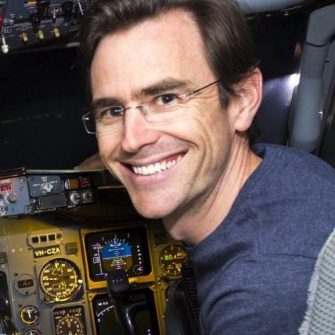
Jeremy Robertson
BAv (Flying) - 1998 Graduate
Aviation Medical Examiner and Commercial Pilot — R&D AeroMed
What appealed to you about UNSW and your degree?
After completing my PPL training whilst in high school, I came to Sydney looking at an engineering degree to accompany my flight training. My careers advisor actually gave me a brochure on the UNSW Aviation Flying program and it was the exact mix of a university degree and flight training I wanted. Any other aviation programs available were just a generic science degree with flight training tacked onto it. The subjects at UNSW Aviation were actually tailored towards the industry with a diverse range of knowledge taught. That was what drew me to aviation in the first instance, the complexity, the interconnection of a variety of problems, and the ways in which to solve them.
What is the most valuable thing you took away from your time at UNSW?
The Flying program was a great mix of being on campus where shoes were optional, and going out to the FOU at Bankstown dressed smartly in your uniform. The friends I made during my time at UNSW I am still in touch with today, and include some of the current FOU staff members.
The calibre of flight training at the school built a reputation in the industry. It gives weight to my qualification when I tell people I completed my flight training at UNSW.
Where has your career taken you? Studied Medicine
After I graduated from UNSW I worked for the university as a flight instructor. I was grateful for the opportunity as obtaining your first job in the industry is often the most challenging. I then spent a year and a half as a scenic and charter pilot in the Kimberley before being accepted into Qantas. I spent four years as a second officer on the 747-400 and then moved into a first officer role in the 767. Whist I was working on the 767 I was able to get involved in the flight technical side and was trained as a maintenance test pilot. During this time, I also studied part time and completed a Masters of Aerospace Engineering with a thesis on thrust modelling and visual flight data acquisition for the Jabiru J400.
In 2010 I was diagnosed with Type 1 diabetes which meant I lost my aviation medical certificate and was no longer able to fly commercially, so I decided to go back to university and study medicine. Given my aviation background I now work as a Designated Aviation Medical Examiner (DAME) and am undertaking specialty training in aerospace medicine.
After a 3-year submission process with CASA, in May 2020 I became the first person in Australia treated with insulin to attain a Class 1 Medical certificate. Now, in addition to my medical work I have recently commenced working part time as a flying instructor.
What innovations do you think the industry needs?
From an aviation medicine point of view the current three tier system of medical standards needs to be reviewed and expanded in order to be more appropriate to the wide variety of flying, from recreational up to commercial air transport, that occurs here in Australia.
What would your advice be for those currently studying or considering the study of Aviation at UNSW?
Completing your education at UNSW doesn’t only give you high quality flight training but also a deeper level of industry knowledge that just doing your pilot training cannot give you. The current environment and my 25 years in the industry has proven that you need to have a fall back during the down turns. Completing my flying training with UNSW gave me a tertiary qualification that allowed me a much easier path into postgraduate study when I lost my medical.

Nishant Sharma
BAv (Management) - 2013 Graduate
Growth Managerr — GHC (Good Health Company)
What appealed to you about UNSW and your degree?
I started at UNSW doing a Bachelor of Aviation Management. During my first year I had the chance to study across a range of areas and I decided Aviation Management has excellent scope in terms of career. I also considered the great Aviation facilities available and the future of the aviation industry. When I looked at my options for an Aviation degree, UNSW was always my preference as its rankings are superior and nothing beats living in Sydney. It’s a beautiful city.
What is the most valuable thing you took away from your time at UNSW?
My degree covered a lot of subject areas with a range of backgrounds from different schools within UNSW. Learning across so many areas I could interact and make friends with students from other degrees. I’m still close with the friends I made at UNSW. Even across the world we keep in touch. Bachelor of Aviation Management engages you by bringing the whole class together to participate and learn. Living on campus I interacted more with people doing all types of degrees and now my friends range from Neurosurgeons to Judges & Airline Captains to top Architects.
Where has your career taken you?
I’ve worked in different domains and departments within the aviation industry from operations to marketing for Delhi International Airport. While working in Operations, I was part of the Terminal Operations team, a team that helped Indira Gandhi International Airport achieve the ranking of World's 2nd Best Airport in the largest airport category.
In marketing, I planned and launched a landmark project which was a first of its kind in the country, a complete customer driven initiative program ‘Shop & Collect’.
Also, planned and successfully executed offline retail promotions for National Events at Delhi Airport. Due to having an extensive global aviation knowledge learned at UNSW; I Implemented strategies for increasing revenue and sales through lucrative discounts & promotions for passengers within the SHA of the airport.
What innovations do you think the industry needs?
The aviation industry is changing at a very fast pace. Looking at the times now, more automation is required. The world is becoming a more tech friendly place, advances toward technology is needed. Due to covid we’ve started understanding that 0 interaction between travellers and airport authorities is possible and we need to make them more seamless; starting from the airport entry gates to boarding flights. A complete seamless app experience is needed.
A passenger should be able to book a cab, check-in, drop off luggage, order food in the Security Hold Area of the airport & board the flight, while still be rewarded through payback options all through a single application; installation of NFC’s at the airport would not only benefit the passenger in making their experience easy but will also provide airport service operators with the insights needed regarding passenger needs (e.g. discounts/offers at their favourite stores when they walk past it).
Providing the right information at the right time is key to this; it could be further expanded by partnering with different airports something what GMR airports has done by developing their ‘HOI' app which expands beyond its Delhi Airport.
What would your advice be for those currently studying or considering the study of Aviation at UNSW?
Aviation at UNSW is a great course. The industry is fascinating as every day flights are becoming more luxurious with shower and bed facilities, and airports are becoming more & more like shopping malls. Flying is the future as flights are becoming more affordable and travel time between countries is decreasing. There’s a lot to do and innovate within the sector and UNSW Aviation is where innovation happens.
